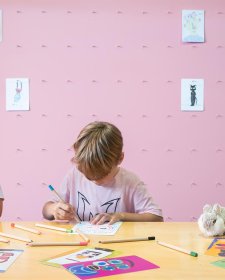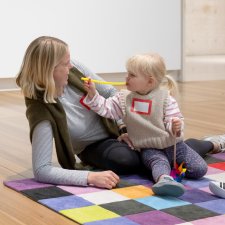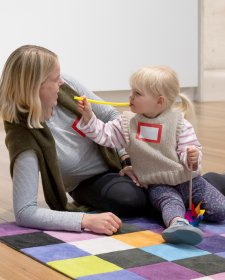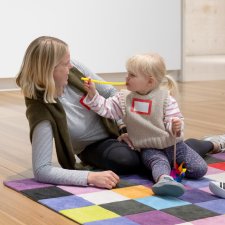Basketballer Andrew Gaze and photographer George Fetting.
This video was produced with funds donated by Tim Fairfax AC.
- [George Fetting] It's lovely. Bring the face around, lift. Hold this, hold this. Yeah. That looks so good.
- [Andrew Gaze] Very much born into a basketball environment. When I was born, my dad was the general manager of the Victorian Amateur Basketball Association, and we lived in Albert Park in Melbourne. And what they did is back in the late '50s, there was these old army warehouse storage facilities that were no longer required, and the Commonwealth gave it to sport. And one of them was converted to basketball, one was to badminton, one was to table tennis, and in their wisdom, when they were doing this conversion, basketball built a manager's residence that was attached to the basketball stadium. And with my dad's job primarily was running that facility and trying to grow the game. So from the time I was born until I was about 13 or 14, I lived in that facility, so I had a very unique upbringing, and combined with that environment was the fact that my dad was an elite player and an elite coach. So the combination of an incredible environment with a nine-court basketball stadium really as my backyard and a dad that clearly had the wisdom to coach and teach gave me a bit of an advantage over my peers. Although I was born into a basketball environment, I never really had basketball athleticism. I had good size, I was always a little bit taller, and I grew to be 201, which I think is about 6'7". So I had an advantage with my size, but I was never blessed with great quickness or athleticism. Because I lived with that nine courts in the backyard, the amount of hours that I spent just shooting the ball. And a lot of times, it never really felt like official practice. You're just there, you've got nothing to do, and out in the back, your mates come around, and you want to shoot some hoops, and well, it wasn't official practice, so it didn't feel like practice. It absolutely was practice, and because of that, I was able to develop a reasonable perimeter game. For me, I think that the biggest advantage was because I played so much throughout those formative years, was just an understanding of the game. And I was able to use that knowledge to compensate for some of my athletic deficiencies. So it was, all of the stars aligned for me, and I was fortunate to be in the right place at the right time in the right environment with the right parents, and all those factors came along nicely for me and enabled me to have a respectable career playing the game. The career highlight for me, it's hard to answer, because I've been blessed with so many unbelievable opportunities, and it's kind of like asking which one of your kids do you love the most, because they all mean so much. But I guess if you twisted my arm, and you said well you had to pick one, it would be representing Australia and playing in the Olympic Games. Because of my dad's involvement in the sport, I was motivated and inspired as a youngster to want to replicate that, and I learned, not just about the basketball, I learned about spirit of the competition, and all the other values associated with it were instilled in me at a very young age. For me, as a youngster, putting my head on the pillow and thinking of the most heroic thing I could ever do, and that was that to hit the winning basket for Australia to win the gold medal of the Olympic Games. That was my boyhood dream. And I suppose because of that, those opportunities to play for Australia and experience the Olympics and all the things that go along with it are the things that I admire the most and respect the most and feel the most grateful for. You got to turn whatever the challenge is, sometimes it can be arduous, where you're out on the floor, and you're spending a lot of hours, the coach is barking at you, and there can be circumstances that can really take you out of your comfort zone. But in your own head and in your own imagination, you've always got to keep it in perspective and understand it's gotta become fun, and you've got to sometimes make it fun. And if you can do that, and you have a love and a passion for the sport, you give yourself a chance. So have fun, enjoy the game, put the time in, but keep it in perspective, and make sure that you don't compromise other areas of your life in that pursuit.
- [George Fetting] I'm a bit seat of the pants. I know what I want, and sometimes, with a bit of serendipity, you've got to be a little bit lucky as a photographer. Sometimes, you know, the planets align, and it all comes together. And you know, you might take 30 pictures, and there's just one. That's all you need. And the face is an amazing thing. You know, you can shoot a face, and the slightest nuance, 29 don't work, and there's one shot, and you go, why does it work? Who knows. That's just the luck involved. I like photographing people. It means something to me, or for whatever reason, it resonates. You know, you can go with preconceived ideas, and everybody does. And then all of a sudden out of left field, something happens, someone does something. I'm an old pressin another life, and I work pretty fast, but I know when I've got it pretty much, I know when I've got what I want. So, and sometimes, it's luck involved. That's just the way it goes, you know. That's half the fun really. Get back, and you look at your negs, oh, your negs, you know, you go on your screen, and you go through, and you go, yes, I've got it. See the difference right there? Albert Watson is one of my heroes, an English photographer. He always said that 80 percent of a photograph was actually talking to your subject. I concur completely, because if you can make someone relax, do a bit of research, drop a bad one-liner, I don't know, just let them drop their guard, because I want to get behind that. I want to get them off guard. And that's the shot you want. You don't want that standard sort of stock headshot. You want to get stuff behind that, and that's what I'm okay at. You know, you don't always get it, but that's what, I enjoy getting that, going yes, gotcha!
Related information



Art cart
Thom Roberts
Drop into the Gallery any time for free creative activities inspired by artist Thom Roberts and his exhibition, The Immersive World of Thom Roberts.



Portrait Play
Face the music
Join us for Portrait Play these school holidays as we explore portraits and music. Come and meet the people that live on our walls, discover musical instruments hidden in the portraits and get creative on your journey through the galleries.



Little Faces
Do we have a treat for the smaller humans in your life! Little Faces is for babies and toddlers (with their grown up) to play, sing and have fun discovering a portrait together.




